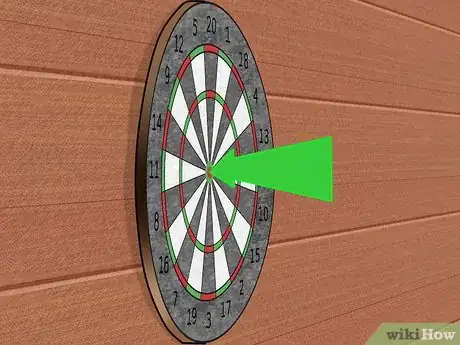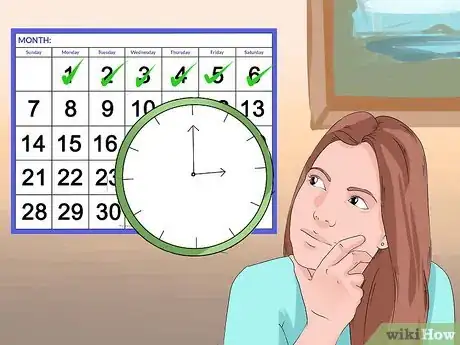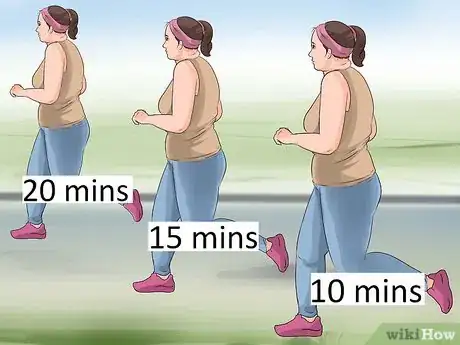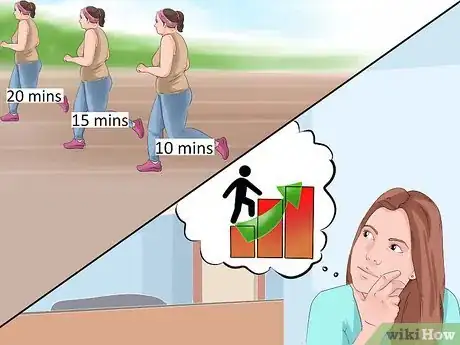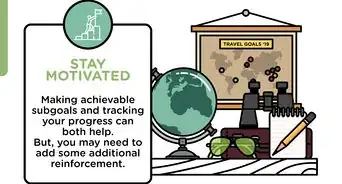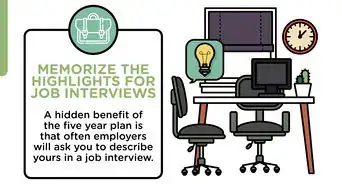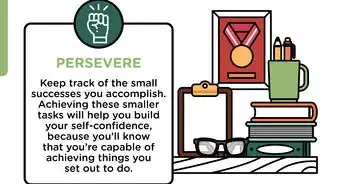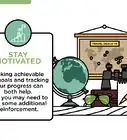This article was co-authored by Trudi Griffin, LPC, MS. Trudi Griffin is a Licensed Professional Counselor in Wisconsin specializing in Addictions and Mental Health. She provides therapy to people who struggle with addictions, mental health, and trauma in community health settings and private practice. She received her MS in Clinical Mental Health Counseling from Marquette University in 2011.
There are 19 references cited in this article, which can be found at the bottom of the page.
This article has been viewed 26,658 times.
A 16 week challenge is a strategy for achieving a major goal in a relatively short period of time. Whether your goal is to lose weight, save money, start a new business, make extra cash to take an expensive trip, or to build better relationships with the in-laws, a 16 week challenge might be a good strategy for you. To get the most out of this approach, you'll need to dedicate yourself consistently and intensely for the entire period
Steps
Setting Your Goal
-
1Decide what you want to achieve. Success in a 16 week challenge depends on picking a goal that is important to you. Think carefully about what you want to achieve before you begin.
- A 16 week challenge means intense work toward a goal over the challenge period. Because of this, you must be certain it is something you are committed to. Assess your level of commitment and be sure you are willing to dedicate the time and effort before you begin.[1]
- Ask yourself why you want to achieve this goal. This will help you determine if it is truly what you want, or if it is just one path to something else.[2]
- For example, if your goal is to learn to play the guitar, ask yourself why that is. If you find that you only want to play the guitar because you think it will improve your social status, you may want to set a different goal. There are other ways to increase your popularity that are easier than trying to learn to play instrument in 16 weeks. If a love of music isn't your true motivation, you may not achieve your goals.
-
2Be as specific as possible. A goal that is clear and specific is much easier to achieve than one that is not. In 16 week challenge, being specific is doubly important. This is because you will waste valuable time if you have to clarify your goals during the challenge period.
- Having a clear goal makes it easier to create an effective plan for achieving it. It also makes it easy to tell whether you have reached your goal.[3]
- For example, imagine you are in a psychology graduate program, and you want to read certain number of books over 16 weeks. Don't just say "I want to read 12 books about psychology." Specify exactly which books you want to read during that time. Once you've read them all, you've achieved the goal.
Advertisement -
3Make sure it is realistic. Set a goal you can achieve. This sets you up for success. That can make it easier to get motivated to work on future goals.[4]
- Setting an unrealistic goal can also mean making less headway on your 16 week challenge.
- For example, imagine you set a goal to read 30 academic books cover-to-cover in 16 weeks. That goal would be very hard to achieve, and might not be realistic. You might think that setting the bar so high will encourage you to work harder. But, if you get to week eight and have only read nine books instead of 15, this could lead to discouragement rather than inspiration.
Preparing for the Challenge
-
1Create a plan. Planning ahead is important for your 16 week challenge. You should know not only what you want to achieve, but how to go about achieving it. A good way to do this is to break the goal down into parts or subgoals.
- Breaking the goal apart into clear, achievable steps will make it seem more manageable. It will also mean it is always clear what you need to be working on to achieve the goal.[5]
- Again, if you have to do this during the challenge period, you will waste valuable. Planning in advance means working more efficiently during the 16 week challenge.
- For example, imagine your goal is to write a novel in 16 weeks. Your steps might be to come up with a concept, develop an outline, draft each chapter, and edit and revise each chapter, and then copy-edit the manuscript.
-
2Set deadlines. Within your plan, set deadlines for completing each step. Or, create benchmarks relating to how much progress you want to make by the end of each week.[6]
- Having deadlines will help keep you accountable and motivated.
- For example, if your goal is to lose 50 pounds over the 16 week challenge, that means you'll need to lose an average of just over 3 pounds a week. Write this into your plan.
-
3Plan for obstacles. There will always be something that comes up while you are striving for a goal that makes it harder to achieve. To extent that you are able, try to predict as many of these obstacles as you can, and make plans for dealing with them.
- Thinking about potential obstacles in advance will help you be better prepared for them when they arise.[7] This will allow you to deal with them more quickly, so they don't create a major interruption in your 16 week schedule.
-
4Visualize the success. Before you get started on your challenge, spend some time visualizing the process of working for the goal. This can help you feel better prepared. It can also motivate you by bringing to mind all the benefits you will experience as a result of striving for your goal.[8]
- Visualization means imagining yourself doing a task in the way you would like to do it.[9] For example, if you are trying to learn to ride a unicycle, imagine yourself riding smoothly from your house, down to the corner, and back.
- Repeat this visualization often. Rehearsing in your mind can help you build positive habits or develop skills more quickly.[10]
-
5Work on your locus of control. Try to emphasize to yourself that you control your own destiny. This is called an "internal locus of control."[11]
- Whenever you start to have doubts about your ability to reach your goal, use self-talk. Remind yourself that you make your own choices and make your own future. This goes for not only before you start the challenge, but throughout the process.
- For example, imagine your goal is to lose 40 pounds in 16 weeks. An internal locus of control means keeping in mind that achieving this will be a matter of making good decisions and working hard. If, in the fourth week of your challenge, you find you've fallen short of your weight loss goals, this would mean taking responsibility and making the decision to intensify your efforts the following week.
- Of course, events will occur that will be outside of your control. But, how you deal with those events is up to you. Having an internal locus of control means meeting uncontrollable events with a positive attitude and looking for solutions, rather than accepting defeat.
- For example, imagine jogging is part of your weight loss plan, and in the second week of the challenge, you break your foot. This is not a situation you can fix by sheer force of will. But, if you have an internal locus of control, you will look for an alternative exercise that can take the place of jogging, rather than giving up.
-
6Get help. Many people, find it easier to reach goals with the help of others. Especially for these intense, time-limited goal challenges, working with other people can be very helpful.
- If your goal is fitness oriented, consider using a personal trainer. This person can help keep you accountable and motivated. He or she can also provide advice to make your workouts more effective.
- If your goal is more more personal in nature, you might consider working with a "life coach." This is a professional who can provide accountability, encouragement, and guidance.[12]
- If neither of these options is appealing, you can also try to find an "accountability partner" to do the challenge with. This someone you can check in with daily to let them know how your progress is going.[13] They will do the same, updating you on their own 16 week challenge. This can increase motivation for both partners. Your accountability partner doesn't even need to be working on the same goal as you.
- If you don't know anyone who is willing to be your accountability partner, look beyond your friends and family. There are online communities that exist for this purpose.
Working for the Goal
-
1Start right. Pick date at least a few days in the future for your 16 week challenge to begin. Then, get started, setting a reasonable pace that you can keep up.
- Many people tend to start work toward a goal with a lot of enthusiasm, and put a lot of time energy into the first week or two. Enthusiasm is great, but try not to burn yourself out or set standards you can't live up to at the outset.[14] This will only harm your progress later.
- It's better to shoot for smaller goals spread out evenly than it is to work on nothing else but your goal.
- Picking a date a little ways into the future is a good way to help build anticipation. This can provide increased motivation when the challenge begins.[15]
-
2Work hard and consistently. Once the challenge begins, the best thing you can do is put in the time and effort necessary to achieve your goal, and to do so every day.
- In the end, no matter how good your plan is or how lofty your ambitions, the only way to achieve a goal is through time and effort. Get started, stay focused, and stick to the plan as well as you can.
- Work on your goal daily. If you've got weekly deadlines, work on them over the whole week instead of trying to do all the work at the end. Creating a routine of working at it every day will help you form good habits and make steady progress.[16]
- For example, imagine you are writing a book and have set a sub goal of writing two chapters a week. Try to write a few pages every day, rather than pulling all-nighters on Friday and Saturday to finish the work. This will only leave you exhausted as you head into the next week.
-
3Be efficient. In a 16 week challenge, there is no time to waste. Try to work toward your goals as efficiently as possible, avoiding procrastination and distraction.
- For example, imagine you love of television or video games. You might need to put the TV in a closet for the duration of the challenge to avoid distraction.
- When you are spending time working on your goals, focus on that work only, don't try to do other things at the same time. Many people think they are good at multitasking. But in fact, multitasking reduces efficiency and productivity. If you're trying to read or write, for instance, turn off the TV and log out of your social network sites.[17]
-
4Track your progress. Get a calendar, app, or journal that you can use to keep track of how much time you're putting in. Keep track of the subgoals or benchmarks you've achieved.
- Keeping track on a regular basis can help you determine if you're working at a good pace.
- It can also provide a good reminder of what you've already achieved, which can help if you start to run out of motivation.
- Noting your progress toward benchmarks or subgoals can also create a greater sense of accountability.[18] You will not want to feel like you have failed in reaching your subgoals.
- Use milestones to track your progress. For example, if you are trying to lose 40 pounds in 16 weeks, you should lose 2.5 pounds each week. Each month, you should lose 10 pounds. These milestones allow for regular check-ins, so you'll know if you're on track or need to amend your plan.
- If you are using an accountability partner, trainer, or coach, they can provide a lot of help in this area via your regular check-ins.
-
5Keep your motivation high. Achievement of difficult goals requires motivation and perseverance.[19] Work hard, celebrate your victories, and believe in yourself.
- One good way to keep your motivation high is to use reinforcement. Every time to reach a benchmark or complete a subgoal, give yourself a little reward. This can mean adding something good to your life, such as treating yourself to a fancy dessert. Or, it can mean removing something you don't like to do. You might, for example allow yourself to skip a weekly chore as a reward.[20]
- Reinforcement helps you establish a mental association between good consequences and working for your goals. This can boost your motivation. It is much more effective than punishing yourself for failing to meet your benchmarks.[21]
Warnings
- If you have a fitness or weight loss goal, make sure the goals you set will not put an unhealthy strain on your body. Losing too much weight too fast can be dangerous to your health. A sudden and dramatic increase in exercise can too. This especially true if you suffer from certain medical conditions. Consult your doctor before beginning an intense exercise or weight loss program.⧼thumbs_response⧽
References
- ↑ Koestner, R., Lekes, N., Powers, T. A., & Chicoine, E. (2002). Attaining personal goals: Self-concordance plus implementation intentions equals success. Journal of Personality and Social Psychology, 83, 231–244.
- ↑ Brunstein, J. C. (1993). Personal goals and subjective well-being: A longitudinal study. Journal of Personality and Social Psychology, 65, 1061–1070.
- ↑ Morisano, D., Hirsh, J. B., Peterson, J. B., Pihl, R. O., & Shore, B. M. (2010). Setting, elaborating, and reflecting on personal goals improves academic performance. Journal of Applied Psychology, 95(2), 255.)
- ↑ Perrone, K. M., Civiletto, C. L., Webb, L. K., & Fitch, J. C. (2004). Perceived barriers to and supports of the attainment of career and family goals among academically talented individuals. International Journal of Stress Management, 11, 114–131.
- ↑ http://us.reachout.com/facts/factsheet/putting-your-goals-into-action
- ↑ http://us.reachout.com/facts/factsheet/putting-your-goals-into-action
- ↑ http://theinvestingmindset.com/goal-setting-how-to-to-achieve-your-goals-in-7-steps
- ↑ Bandura, A. (1977). Self-efficacy: Toward a unifying theory of behavioral change. Psychological Review, 84, 191–215.
- ↑ http://www.pickthebrain.com/blog/how-to-visualize-your-success/
- ↑ http://www.pickthebrain.com/blog/how-to-visualize-your-success/
- ↑ Rotter, J. B. (1966). Generalized expectancies for internal versus external control of reinforcement: Psychological Monographs: General & Applied 80(1) 1966, 1-28.
- ↑ http://www.lifecoaching.com/pages/life_coaching.html
- ↑ http://www.goal-setting-guide.com/the-role-of-an-accountability-partner-in-goal-achievement/
- ↑ http://www.apa.org/helpcenter/resolution.aspx
- ↑ http://zenhabits.net/the-ultimate-guide-to-motivation-how-to-achieve-any-goal/
- ↑ http://examinedexistence.com/why-having-a-daily-routine-is-important/
- ↑ http://www.reading.ac.uk/internal/studyadvice/Studyresources/Time/sta-distractions.aspx#dealing
- ↑ http://www.ascd.org/publications/educational-leadership/dec09/vol67/num04/When-Students-Track-Their-Progress.aspx
- ↑ Duckworth, A. L., Peterson, C., Matthews, M. D., & Kelly, D. R. (2007). Grit: perseverance and passion for long-term goals. Journal of personality and social psychology, 92(6), 1087.
- ↑ http://www.appliedbehavioralstrategies.com/reinforcement-101.html
- ↑ http://www.mdaap.org/Bi_Ped_Brief_Interv_Behav_Modification.pdf

